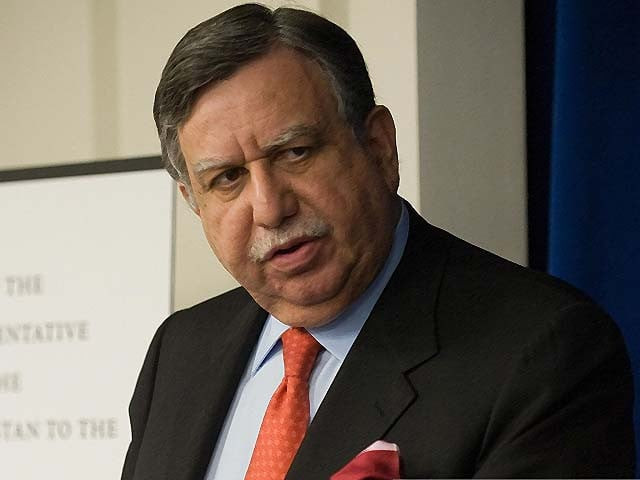'Still feeling pinch’ of previous IMF tranche
Tarin clarifies Saudi $4.2b bailout has nothing to do with delay in deal with global lender

Finance Adviser Shaukat Tarin on Wednesday said the government was still reeling from the conditions met to receive the previous loan tranche of $500 million from the International Monetary Fund (IMF), dropping a hint as to why talks with the global lender could not be concluded.
“I am still facing the brunt of the previous $500 million tranche,” Tarin told journalists while addressing a news conference, along with Energy Minister Hammad Azhar, to share the details of the $4.2 billion one-year loan deal between Pakistan and Saudi Arabia.
The finance adviser clarified that the $4.2 billion bailout package that the Riyadh had agreed to give to Islamabad “has nothing to do” with the delay in the finalisation of the IMF deal.
Tarin added that “one or two outstanding issues” remained between Pakistan and the global lender for the conclusion of the 6th review, without elaborating anything about them.
The completion of the review will pave the way for the release of the $1 billion next tranche in addition to the $1.6 billion injection by the World Bank and Asian Development Bank.
IMF Resident Representative Teresa Daban did not comment on the question as to whether or not Pakistan took the global lender into confidence before securing a $4.2 billion short-term deal from the Kingdom but only said that “discussions and the understanding will continue”.
The IMF monitors Pakistan’s inflows in the context of overall debt sustainability of the country.
To qualify for the $500 million tranche that the IMF disbursed in April this year, Pakistan had accepted five prior actions.
They included the imposition of income tax to the tune of Rs140 billion, submission of a controversial State Bank of Pakistan amendment bill in the parliament and changes to the National Electric Power Regulatory Authority (NEPRA) Act to automatically increase electricity prices.
The other two conditions were Rs1.95 per unit increase in electricity prices and the approval of the Circular Debt Management Plan envisaging further increase of Rs5.65 per unit.
While responding to a question, the adviser assured that talks with the international lender were in the final phase.
“We will have to rationalise taxes, but I will not give any further details,” the finance adviser replied to a question about withdrawing sales tax exemptions on the IMF demand.
Read More: Shehbaz asks govt to brief parliament on IMF talks
He said the IMF had inquired about bridging the gap against the Rs600 billion petroleum development levy target. “We have informed that the low petroleum levy collection will be compensated by an increase in tax revenues collection.”
The Express Tribune had reported 11 days ago that Pakistan and the IMF had failed to reach a staff-level agreement within the scheduled time.
The delay in finalisation of a deal between Pakistan and the IMF had adversely affected the markets. However, the $4.2 billion Saudi injection may temporarily calm the markets.
The adviser said that the Saudi financial support package of $4.2 billion was for one year and would prove to be useful especially when the local currency was under pressure and international oil prices were soaring.
He said the new deal had been secured on the same terms that Pakistan accepted for the previous $6 billion Saudi package. The country had paid 3.2% interest rate on the cash deposits.
In a late-night development, the Saudi Fund for Development (SFD) announced that it had deposited $3 billion in the State Bank of Pakistan (SBP) and provided a $1.2 billion oil facility on deferred payments.
“The State Bank welcomes the support from the Saudi authorities. This support will go a long way in improving the outlook for the country’s balance of payment position”, SBP Governor Dr Reza Baqir told The Express Tribune.
Sharing details, Tarin said Prime Minister Imran Khan had made a request to Crown Prince Mohammad Bin Salman that Pakistan needed assistance because of the increase in global crude oil prices.
He added that the premier had reminded the crown prince that the request for oil on deferred payments was pending decision for a long time and Salman immediately approved it.
“Saudi Arabia has given a $100 million a month facility, although we had sought $150 million,” said the finance adviser.
However, he added that the $3 billion cash assistance would more than compensate for the requested oil facility amount.
“The Saudi finance minister called me yesterday to inform me about the decision of approving the $4.2 billion package.”
Pakistan’s request for a second bailout package from Saudi Arabia in three years confirms that the economy cannot survive independently and will remain either in the clutches of the IMF or friendly countries.
The central bank’s reserves had depleted to $17.5 billion during the week ending on October 15.
The government was currently in the process of raising $1 billion debt from the international market by floating Sukuk bonds.
The federal cabinet on Wednesday approved to exempt all taxes on profits that the investors will receive on the $1 billion Sukuk-based loan to Pakistan.
Energy Minister Hammad spoke about the reasons behind the increase in inflation in the country and the measures the government was taking to reduce people's problems.
“Since August last year, the government gave Rs450 billion relief in taxes by keeping the petroleum levy and GST rates lower – a move which has now built fiscal pressure,” said Hammad.
The minister, however, expressed optimism that in the coming six months, the global commodity cycle would weaken, and the rates of all commodities including food and energy would come down in the international markets.
“That would be translated locally.”



















COMMENTS
Comments are moderated and generally will be posted if they are on-topic and not abusive.
For more information, please see our Comments FAQ